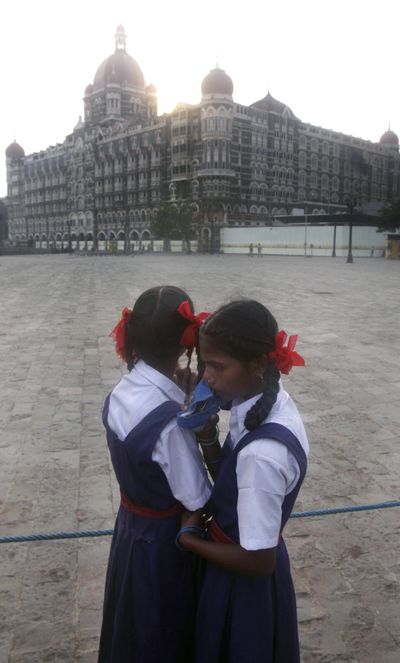Mumbai gunman says group planned demands
Weapons training preceded attack, he says in confession

MUMBAI, India – The gunman captured in last month’s Mumbai attacks had originally intended to seize hostages and outline demands in a series of dramatic calls to the media, according to his confession, obtained Saturday by the Associated Press.
Mohammed Ajmal Kasab said he and his partner, who massacred dozens of people in the city’s main train station, had planned a rooftop standoff but abandoned the plans because they couldn’t find a suitable building, the statement to police says.
Kasab’s seven-page confession, given to police over repeated interrogations, offers new details of the three-day rampage through India’s commercial center that left 164 people plus nine gunmen dead.
He said the assault, which started Nov. 26, was initially set for Sept. 27, but he doesn’t explain why it was delayed. The gunmen had been told by their handlers to carry out the attacks during commuting rush hours.
After reaching Mumbai, Kasab and his partner, Ismail Khan, the group’s ringleader, headed to the train station by taxi.
“Ismail and myself went to the common toilet, took out the weapons from our sacks, loaded them, came out of toilet and started firing indiscriminately toward the passengers,” Kasab told police.
As a police officer opened fire, the two militants retaliated with grenades before entering another part of the station and shooting more commuters.
The men then searched for a building with a rooftop where they had been told to hold hostages and call a contact named Chacha, whom Kasab identified as Zaki-ur-Rehman Lakhvi, the attacks’ suspected mastermind. Chacha, which means “uncle” in Hindi, would supply phone numbers for media outlets and specify demands the two should make.
Taking heavy fire from police, the two had trouble finding a “suitable building” and stormed a hospital they mistook for an apartment building. There, they searched for hostages and traded more gunfire with security forces. It’s unclear if they ever held hostages.
When they left, a police van pulled up and the two tried to take shelter behind a bush during the shootout. Kasab was hit in the hand as Khan returned fire. “They got injured and the firing from their side stopped,” he said.
Police have confirmed the van was carrying top police officials, including the head of the anti-terrorism squad, who was killed.
Rigorous training
In the confession, Kasab, 21, describes his conversion from an aspiring street criminal to a loyal soldier for Lashkar-e-Taiba, the terrorist group banned by Pakistan in 2002 and blamed by India in the attacks.
He came to the organization last year while looking to buy guns to commit robberies after quitting a low-paying job at a catering business. The search led him to several Lashkar “stalls” at a bazaar in the Pakistani city of Rawalpindi, he said.
Kasab went on to receive rigorous training in weapons handling and other skills, attending at least six Lashkar camps and visiting his parents twice during breaks, he said. Lashkar operatives lectured recruits on India security and intelligence agencies and taught them how to evade pursuing security forces.
He said they were shown “clippings highlighting the atrocities on Muslims in India,” images of Mumbai locations on Google Earth, and film footage of the train station.
After Kasab and nine others were picked among a group of 32 recruits, they headed to Karachi in September and practiced traveling on speed boats.
On Nov. 23, the group was transported to a ship called the Al-Huseini far out at sea. Shortly after boarding, “each of us was given a sack containing eight grenades, one AK47 rifle, 200 cartridges, two magazines and one cell phone for communication,” he said.
Al-Huseini’s crew, he said, later hijacked an Indian vessel, killing all but one crew member who was kept alive to guide them into Mumbai’s coastal waters.
“When we were at some distance from the shore, Ismail and (another militant) killed the Indian seaman” before the group boarded a dinghy and came ashore.
Seeking Pakistan’s help
Police said Saturday that Kasab, who’s facing a criminal case in the attacks, has written to Pakistani officials to request legal help.
In a letter written Thursday, he asked for “legal aid” from the Pakistani consulate and requested a meeting with a consular representative, said Rakesh Maria, Mumbai’s chief investigator. The letter was forwarded to India’s government to relay to Pakistani officials, but it was unclear whether it had been delivered.
A number of Indian lawyers – including a prominent group of Mumbai attorneys – have refused to defend Kasab against criminal charges.
Kasab is being held on charges of 12 offenses, including murder and waging war against the country, but has not yet been formally charged.